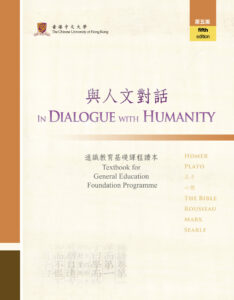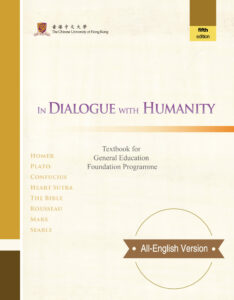

The new fifth edition of the course book (left: Chinese/English Bilingual version; right: All-English version)
The two University General Education Foundation courses “In Dialogue with Humanity (UGFH1000)” and “In Dialogue with Nature (UGFN 1000)” are reading-intensive. Students enrolled in the Humanity course are required to read excerpts from classical texts of Eastern and Western traditions. Informed and inspired by the views expounded in the texts, students are invited to reflect on issues concerning good life and good society. The course book In Dialogue with Humanity is not only an anthology to facilitate teaching and learning, but also a manifestation of the idea and design of the course. The text selection sets out a broad context for teaching, learning and exploring the meaning of life and society. The following twelve classics with slight variations in text selection were printed in the different editions of the course book from 2011 to 2015. Apart from Plato’s Symposium and the Heart Sutra, which were included in full, only excerpts from the classics were printed.
Part 1: Self in Search of Self: My Potentials, My Value
1. Homer. The Odyssey
2. Plato. Symposium
3. Aristotle. Nicomachean Ethics
4. Confucius. The Analects
5. Zhuangzi. Zhuangzi
Part 2: The Limits of Human Power: My Doubts, My Fear
6. The Heart Sutra, supplemented by Thich Nhat Hanh’s commentaries
7. The Bible
8. The Qur’an
Part 3: Self in Social Institutions: My Ideal Society
9. Huang Zongxi. Waiting for the Dawn
10. Jean-Jacques Rousseau. Social Contract
11. Adam Smith. The Wealth of Nations
12. Karl Marx. Economic and Philosophic Manuscripts of 1844
The section titles were changed to “Part 1: Self and Human Capacity,” “Part 2: Faith and Human Limitation,” and “Part 3: Self in Social Institutions” in the later editions. The new titles are shorter and more general, thus leaving more interpretive flexibility to teachers.
In 2015, the syllabus was slightly revised. Instead of twelve, the following eleven texts formed the core of the text selection:
1. Plato. Symposium
2. Confucius. The Analects
3. Zhuangzi. Zhuangzi
4. The Heart Sutra, supplemented by Thich Nhat Hanh’s commentaries
5. The Bible
6. The Qur’an
7. Huang Zongxi. Waiting for the Dawn
8. Jean-Jacques Rousseau. Social Contract
9. John Stuart Mill. On Liberty
10. Adam Smith. The Wealth of Nations
11. Karl Marx. Economic and Philosophic Manuscripts of 1844
Between Social Contract and On Liberty, teachers chose one to teach, together with the other nine classics. Section titles were removed, and teachers could arrange their own order of teaching. On top of these, they had the liberty to teach up to two texts of their choice upon consent of the course coordinator. Among the selected classics, The Analects, Zhuangzi, The Heart Sutra, The Bible and Waiting for the Dawn, were printed in Chinese. Students enrolled in English classes had to rely on English translations of the texts as supplements to the course book. In 2018, an All-English edition was published to meet the needs of these students.
In 2022, teachers of the GE Foundation Programme conducted a comprehensive review of the syllabi of the two courses. After careful consideration, the teaching team of “In Dialogue with Humanity” agreed to reduce the number of texts to eight, introducing new texts to the syllabus while withdrawing others. Starting from September 2023, the new syllabus will include the following classics:
1. Homer. Odyssey
2. Plato. Symposium
3. Confucius. The Analects
4. The Heart Sutra, supplemented by Thich Nhat Hanh’s commentaries
5. The Bible
6. Jean-Jacques Rousseau. Social Contract
7. Karl Marx. Economic and Philosophic Manuscripts of 1844
8. John Searle. Mind, Language and Society
The inclusion of a Greek epic and a language classic widens the scope of the text selection. With the reduction of the number of texts, both teachers and students will have more time to engage in closer reading and deeper understanding of the texts. The new fifth edition of the course book marks a new chapter in the teaching of the course.
General Education Foundation Programme
The Chinese University of Hong Kong
July 2023

